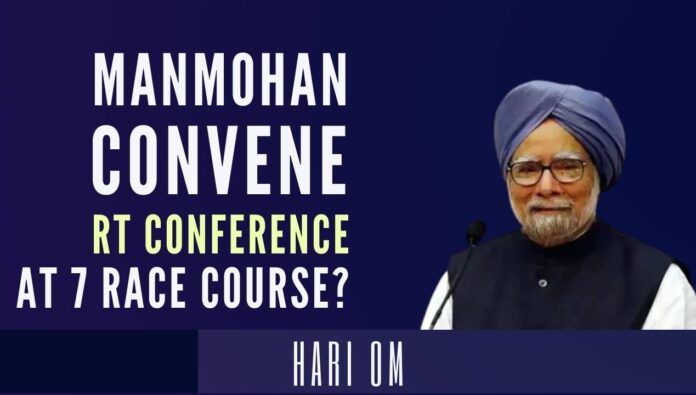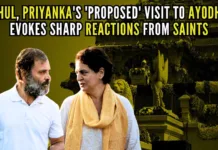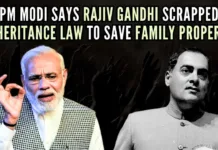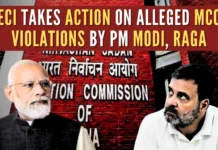
Truth is that Congress never considered J&K part of India in the real sense of the term
Did former PM Manmohan Singh convene the round table conference on J&K at 7 Race Course on February 25, 2006, to neutralise the believers in the concept of national unity and integrity, or to dilute the pro-India and accord respectability to the votaries of self-rule? Did he organise it to ascertain the views of all “stakeholders” in the state on the so-called Kashmir problem and seek their help so that he could finalize a framework that was acceptable to a wide spectrum of population as far as possible and advance further the paramount national interests in J&K?
Careful scrutiny of what he said while concluding the seven-hour long session in which state-based pro-integrationists, separatists and champions of self-rule participated, suggests that the purpose of the whole exercise was to neutralise the pro-India voice and send a clear message that the Congress-led UPA Government was not averse to the idea of the separatists getting the veto power and the state going outside the purview of what laid embodied in the constitution.
The Congress was represented by no less than 12 leaders, the PDP four, the PP five, the PDF two and the CPI and CPIM one each
How else should one interpret his concluding remarks to the effect that “there is a need to evolve a common understanding on autonomy and self-rule for J&K” and that “I am confident that working together with all groups, both within and outside the mainstream, we can arrive at arrangements within the vast flexibilities provided by the Constitution”. Again, how else should one describe the conspicuous absence in his remarks of any reference to those from Jammu, Kashmir and Ladakh who talked of the dignity of India, denounced the ideology of hatred, advocated “free flow of the Indian Constitution, minus Article 370” and reorganisation of the state polity?
What should be made out of his regret over the non-participation of the separatists in the round table conference and his suggestion that his Government would continue to persuade them to participate in such conferences to be held in days to come? Singh’s suggestion of evolving a consensus and “common understanding on autonomy and self-rule” in such conferences should also mean nothing but the dilution of the pro-India position and an attempt at throwing in the lot of the state with those who hated India and its ethos.
The round table conference was virtually the show of the Congress and its allies in the state, including the People’s Democratic Party (PDP), Panther Party (PP), People’s Democratic Forum (PDF), CPI (Communist Party of India) and CPIM (Communist Party of India (Marxist)). The Congress was represented by no less than 12 leaders, the PDP four, the PP five, the PDF two and the CPI and CPIM one each.
The champions of greater autonomy, bordering on virtual sovereignty, were also there in strength: The National Conference (NC) and those who had all advocated the need of limiting the jurisdiction of India over the state to just three subjects – defence, foreign affairs and communication. The votaries of total independence from both India and Pakistan, including chairman of Democratic Liberation Party (DLP) Hashim Qureshi, were also present.
One of the senior officials even approached the then National Security Advisor M K Narayanan to allow this writer to express his views, but nothing came out of his sincere effort.
The advocates of “free flow of the Indian Constitution, barring Article 370”, were also present, but they were in a minuscule minority. Their number was just ten, to be precise. Two each belonged to the BJP, including this writer, Panun Kashmir (PK), the Congress (one belonged to Jammu and the other to Leh), and one to the Jammu Bar Association.
Even a cursory look at the composition and complexion of the round table conference convened by the former PM would reveal two things:
- It was virtually a truncated conference in which reactionary elements and those who stood for the dilution of the Indian sovereignty over J&K reigned supreme. It would be extremely difficult to avoid this conclusion if one goes by what the Congress, PDP, PP, CPI, CPIM, PDF, NC and those representing Ladakh’s Kargil said before and after the lunch sessions.
- Those members who were deemed inconvenient as far as the issues of national dignity and interest were concerned were excluded from the whole exercise. Of course, this was expected.
It must be noted that the organisers of the round table conference had not only ensured a massive presence of the reactionary elements, they had also made it a point to see that that deemed inconvenient could not get time to speak or explain their point of view. It may sound ridiculous but it is a fact that only seven of the ten integrationists were given the opportunity to speak, The remaining three too wanted to share their views, but could not. One of the senior officials even approached the then National Security Advisor M K Narayanan to allow this writer to express his views, but nothing came out of his sincere effort.
However, we did meet the PM and handed over our papers containing our views on the grave ills that would erupt if what Pakistan and the valley-based votaries of self-rule and autonomy had been advocating everywhere was accepted. As for the reactionary elements, each one of them was given more than enough time to express his or her views on such divisive and communal ideas as self-rule and autonomy and paint the integrationists in poor light or condemn them unheard. They spoke and virtually criticised the Indian state for more than five hours in the presence of none other than the Prime Minister. And he listened patiently to the heap of calumnies.
A few words on the mode of discussion in the round table conference will be in order. The NSA (National Security Agency) would seek the approval of the then Union Minister of Water Resources (read Saif-ud-Din Soz) and announce the name of the Speaker. The Speaker would thereafter express his views and that was all. There was no discussion at all. And, that was all on expected lines. The invitation letter had clearly stated that the aim of the round table conference was to enable all the “stakeholders” in the state to share their views with the PM. It was nowhere mentioned in the letter that the purpose of the round table conference was to arrive at some solution to the issues confronting the state then and there and that the PM would listen to both sides and give his judgment.
It is clear that the round table conference and the concluding remarks of the PM had only served to embolden further the reactionary elements. What an irony? Towards which direction was the Indian nation heading? What had the 7 Race Course in mind? Had it planned to make common cause with the United States and its terrorist friend Pakistan and compromise our position in J&K? If one goes by the remarks of the PM on self-rule and autonomy and what his advisors told the media after the round table conference was over, one would be left with no other option but to conclude that his Government had finally decided to play with dangerous tools. The truth is that Congress never considered J&K part of India in the real sense of the term. It’s heartening that PM Narendra Modi and HM Amit Shah started undoing the Congress’ grave wrongs and integrating J&K into India after July 2019.
Note:
1. The views expressed here are those of the author and do not necessarily represent or reflect the views of PGurus.











Hari Om Ji, good article reminding us about UPA govts nasty intentions and decisions taken then. Further Maun Mohan Singh also told us that beneficiaries of all doles would be Moslims “first” in India!! Majority Community tax payers stand and get “second” class treatment.
Here, former PM MMS and Super PM Sonia as NAC and Associate PM Rahul are not the losers because power has come to them just like that under India Shining campaign in 2004 of BJP under 42 degrees centigrade Summer heat. These three do not like our Country.
Look at the way three of them granting statehood to Telangana by closing Parliament doors!!! Hence MMS having 26th Feb 2006 round table conference with their bosom allies and friends meeting decided to grant “self rule” by generalizing our constitution which frightens us the most at the backdrop of on goings in JK. few days ago JK governor took a decision to weed out terrorists planted as employees in the state Govt departments.
Our country is still vulnerable and hence, in my humble opinion we should revisit the entire Home Ministry and divide it into two or three ministries for better management with sophistication using technology and by employing strategic best brain resources. Home Minters should not do election campaigns.
Congress never wanted strong ,united India. It could have created mountain of peace, land of peace, river of peace by surrendering to the whims of external and internal enemies